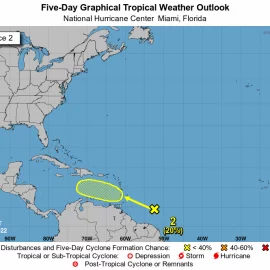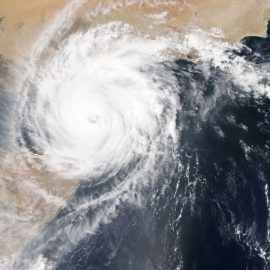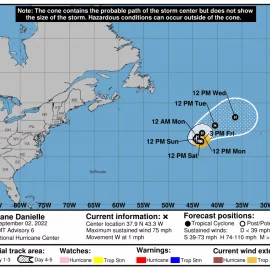
June 1st to November 30th is the hurricane center and maybe the first one is forming later from Agatha who hit Mexico on the Pacific side.
Hurricane season begins June 1, and south Louisiana must again hope for the best but prepare for the worst. Here are 10 questions and answers on what’s predicted, how to prepare and how to respond. How many storms are predicted? NOAA is predicting another above-average hurricane season, which runs from June 1 to Nov. 30. It has forecasted 14-21 named storms, including three to six major hurricanes, or those Category 3 and above. If those predictions prove correct, it would be the seventh straight above-average hurricane season. What factors contribute to this year’s forecast? Particularly warm waters for a range of reasons, including the Loop Current and climate change, have contributed to the outlook. This year also includes a La Niña pattern in the Pacific, which means that there is not expected to be enough wind to shear across tropical formations in the Atlantic and prevent them from developing.
nola.com
The list continues.
How should you prepare? State officials urge residents to have an evacuation plan in place for their families and to tune in to local updates, which will also provide information on shelters. Fuel up your car and gather three to five days’ worth of non-perishable supplies. Bring in all objects such as lawn furniture that could act as flying missiles in the wind. Board up your windows if needed. Do not leave your pets behind. For more tips, download the state’s emergency preparedness guide. When should you evacuate? Pay attention to local updates on evacuation orders and advice. Parish leaders will issue evacuation orders if needed. Traffic will be heavy, so don’t wait until the last minute to leave. Take into account the specifics of your situation, including if you must care for elderly family members, and leave with enough time to sparWait for the OK from local and state officials before returning. Do not touch downed power lines and make sure tap water is safe before drinking or cooking with it. Be prepared and have sufficient supplies to cope without electricity if power is out.e to avoid placing them in risky circumstances. Sooner is almost always better than later. When should you return home?
More tips and questions answered.
What should you do if your home is damaged? Go to FEMA’s disasterassistance.gov to find information on available assistance. If your home is flooded and you have flood insurance with the NFIP, learn how to file a claim. Find advice on filing a homeowners’ insurance claim. Low-interest loans may also be available to you through the U.S. Small Business Administration. Should you be worried about your insurer under compensating you after hurricanes? Many residents in recent years have spoken of frustrations with their insurers after storms. Lots of advice can be found at the Louisiana Department of Insurance’s site on the subject. A few key points: Take pictures or video of damage, Keep receipts from temporary repairs and Do not start permanent repairs until your adjuster instructs you to do so. What if you don’t have insurance? FEMA can often provide help to those without insurance. Go to disasterassistance.gov for more details as well as sba.gov/disaster.
More tips and sources for help.
What other assistance outside of governmental resources are available? Help can also be obtained through the Red Cross, the United Way and various charitable organizations. Lots of advice and links can be found at the website of the Governor’s Office of Homeland Security and Emergency Preparedness. How can I avoid contractor fraud after hurricanes? Contractor fraud is a major problem after storms, with residents desperate to repair their homes often targeted. Verify the contractor is licensed at lacontractor.org and do not provide a down payment of more than 10%. Never pay with cash. Take a photo of the contractor, their ID and credentials just in case. Read our earlier story for lots more advice. Stay up-to-date on hurricane season with NOLA’s Hurricane Center newsletter.
Just thoughts on how to survive the season.



